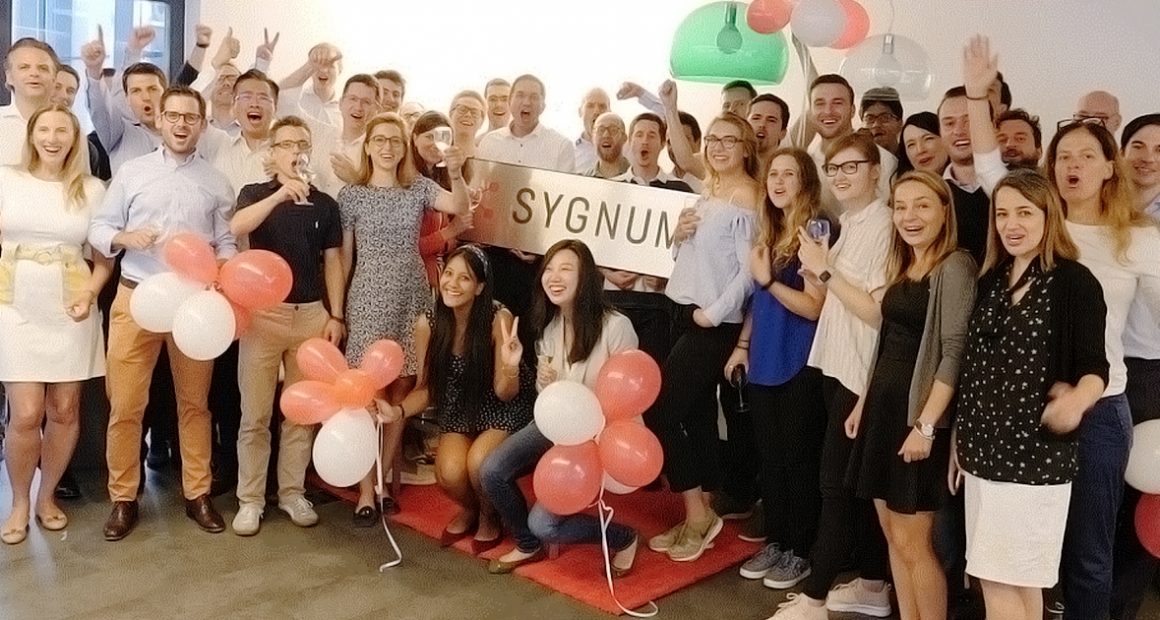Secure issuance, storage, trading and management
In late August, Sygnum, received FINMA (Swiss Financial Market Supervisory Authority), licensing. The Singaporean and Swiss, digital asset technology group can now deliver traditional bank-grade secure services to its customers. “If we think about the services that are accessible at a regular bank today, Sygnum operates in a similar fashion for digital assets. However, it is essential to say, that digital asset banking is not an extension of legacy banking. The services offered by a digital asset bank run complementary to it.” Tells Mr. Imbach.
Sygnum’s integrated solution offers secure issuance, storage, trading and management of digital assets. These include Bitcoin, Ethereum, Digital CHF and asset tokens, integrated seamlessly into one account. Services include custody, brokerage, Lombard loans, and B2B banking services, with plans for tokenization.
“In Singapore, Sygnum has applied for a Capital Markets Services (CMS) license from the Monetary Authority of Singapore (MAS). On receipt of this license, Sygnum will offer a multi-manager fund providing compelling collective investment opportunities in the digital asset space.”
“The banking license allows us to bank digital assets, such as Bitcoin and Ethereum, and to provide a banking infrastructure. This allows institutional investors to access opportunities in the digital asset economy with complete trust.”
With institutional-grade digital custody and fiat-digital asset gateway, custody is fully integrated with a liquidity platform that offers fast and reliable execution for major digital assets, including Bitcoin and Ethereum.
Partners
They are partnered with Swisscom, the leading ICT player in Switzerland and one of the key IT infrastructure providers for the financial industry. “We are also partnered with Deutsche Börse Group, a world-renowned market infrastructure provider for capital markets. Together with our partners, Sygnum, is shaping the development of a trusted digital asset ecosystem with institutional-grade trust. We are also in close contact with SIX Digital Exchange and hope to be one of the first banks connected to the digital assets exchange.”
Sygnum does not only cater to EU clients, “Sygnum is a fully regulated Swiss bank operating out of Switzerland and is able to service clients globally. Different countries are subject to compliance and cross-border requirements. Our strategy is to focus on the strengths of Switzerland’s traditional banking heritage and the growth and power of Asia from Singapore.”
So what clients are interested in Sygnum?
Their target clients are institutional and private qualified investors, corporates, banks, and other financial institutions.
“Since the license was awarded, we have been experiencing an overwhelming number of preboarding submissions. The people that have come to us can be broadly separated into two categories. The first group is digital investors who are looking to either invest in new assets or to commit their existing assets into custody in a safe way. The next group is mostly in the asset management field, including asset managers, existing brokers, family offices, looking for a safe gateway to access the market or a bank who knows how to deal with this asset class. We are also in discussions with banks to support them in offering digital assets to their clients, leveraging our white-label solution.”
“Sygnum’s plans for corporates include the ability to raise new capital by producing asset tokens based on existing financial assets. Thereby lowering capital raising costs, making corporate actions easier, and improving liquidity for issuers and investors.
What many people misunderstand about the tokenization of assets, is that the various services or components of the process can somehow be individually or independently managed. We must realize that in order for secondary markets to function, for example, there is an entire back-end support infrastructure required that is also regulatory compliant. So, managing everything from issuance to settlements of a digital asset must be embedded within the entire digital asset infrastructure.”
As a bank, their business is quite different in nature with DeFi. How the trust primitives are built, for example, “ultimately, we respond to the needs of our customers and clients. It is still very early days and new protocols are being developed and improved every day.
However, we are open to collaborating with other companies and developers in this respect. We believe in a future of collaboration, not a competition!”
Since the concept of issuing a digital token as a regulated security emerged, many companies have begun to explore service offerings at various stages of the process. “The process of getting here is not one of luck or good fortune, and the relative speed with which we have been regulated is a testament to the quality and experience of the Sygnum team.”
Financial Services
Being the only one in this market, anything similar becomes a direct competition. How does Sygnum tackle this? “We believe that no single start-up, incumbent financial institution, association or technology company can unilaterally pave the way from mainstream awareness to mainstream adoption of DLT-powered financial services. We believe that shaping the development of a digital ecosystem with trusted partnerships, fuelled by relentless customer focus, will accelerate industry and community growth and enable impact.beyond just combining these systems, processes, technologies, what completes the ‘secret sauce’ is having people who understand how these processes work. This is in relation to the bigger picture to build a truly integrated solution. It is not enough to adopt either a traditional banker’s or a technologist’s mindset, with a passion for decentralization – it is about combining different views, experiences, and expertise. Ultimately, it is a passion for where digital assets are headed which will help to color the larger conversation and prevent an ecosystem of silos.”
Now that Sygnum has moved into digital assets, other banks are left to play catch-up, ”we definitely expect traditional banks to start moving into space as a response to the expected growth of demand. However, it would take substantial time and resources to build the necessary infrastructure to deal with digital assets – something that we have built-in a regulated way. Partnerships with existing, regulated companies would be a viable and attractive way for them to expand quickly into this space. We feel Sygnum is ideally positioned to partner, not compete, with innovative traditional banks and other regulated financial institutions.”





